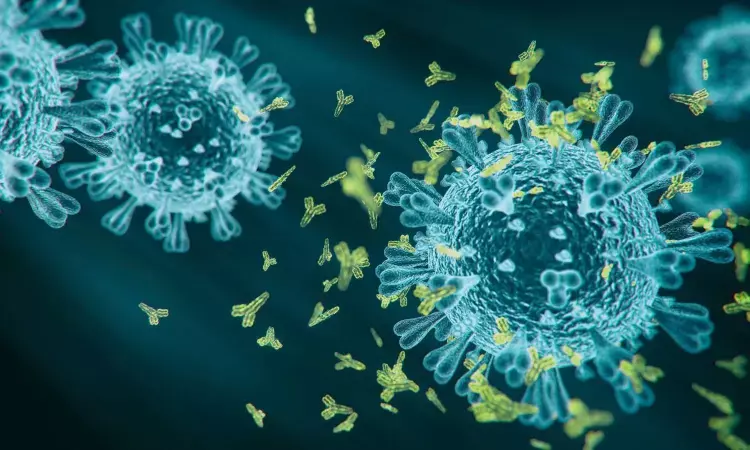- Home
- Medical news & Guidelines
- Anesthesiology
- Cardiology and CTVS
- Critical Care
- Dentistry
- Dermatology
- Diabetes and Endocrinology
- ENT
- Gastroenterology
- Medicine
- Nephrology
- Neurology
- Obstretics-Gynaecology
- Oncology
- Ophthalmology
- Orthopaedics
- Pediatrics-Neonatology
- Psychiatry
- Pulmonology
- Radiology
- Surgery
- Urology
- Laboratory Medicine
- Diet
- Nursing
- Paramedical
- Physiotherapy
- Health news
- Fact Check
- Bone Health Fact Check
- Brain Health Fact Check
- Cancer Related Fact Check
- Child Care Fact Check
- Dental and oral health fact check
- Diabetes and metabolic health fact check
- Diet and Nutrition Fact Check
- Eye and ENT Care Fact Check
- Fitness fact check
- Gut health fact check
- Heart health fact check
- Kidney health fact check
- Medical education fact check
- Men's health fact check
- Respiratory fact check
- Skin and hair care fact check
- Vaccine and Immunization fact check
- Women's health fact check
- AYUSH
- State News
- Andaman and Nicobar Islands
- Andhra Pradesh
- Arunachal Pradesh
- Assam
- Bihar
- Chandigarh
- Chattisgarh
- Dadra and Nagar Haveli
- Daman and Diu
- Delhi
- Goa
- Gujarat
- Haryana
- Himachal Pradesh
- Jammu & Kashmir
- Jharkhand
- Karnataka
- Kerala
- Ladakh
- Lakshadweep
- Madhya Pradesh
- Maharashtra
- Manipur
- Meghalaya
- Mizoram
- Nagaland
- Odisha
- Puducherry
- Punjab
- Rajasthan
- Sikkim
- Tamil Nadu
- Telangana
- Tripura
- Uttar Pradesh
- Uttrakhand
- West Bengal
- Medical Education
- Industry
Experimental monoclonal antibodies show promise against Epstein-Barr virus

Researchers have discovered a panel of investigational monoclonal antibodies (mAbs) targeting different sites of the Epstein-Barr virus (EBV) blocked infection when tested in human cells in a laboratory setting. Moreover, one of the experimental mAbs provided nearly complete protection against EBV infection and lymphoma when tested in mice.
The results have appeared online in the journal Immunity. Scientists from the National Institute of Allergy and Infectious Diseases (NIAID).
Epstein-Barr virus (EBV) is one of the most common human viruses. After an EBV infection, the virus becomes dormant in the body but may reactivate in some cases. It is the primary cause of infectious mononucleosis and is associated with certain cancers, including Hodgkin lymphoma, and autoimmune diseases, such as multiple sclerosis. People with weakened immune systems, such as transplant recipients, are more likely than immunocompetent people to develop severe symptoms and complications from EBV infection. There is no licensed vaccine to protect against the virus.
The researchers developed several investigational mAbs targeting two key proteins-gH and gL-found on EBV's surface. The two proteins are known to facilitate EBV fusion with human cells and cause infection. When tested in the laboratory setting, the investigational mAbs prevented EBV infection of human B cells and epithelial cells, which line the throat at the initial site of EBV infection.
Analyzing the structure of the mAbs and their two surface proteins using X-ray crystallography and advanced microscopy, the researchers identified multiple sites of vulnerability on the virus to target. When tested in mice, one of the experimental mAbs, called mAb 769B10, provided almost complete protection against EBV infection when given. The mAb also protected all mice tested from EBV lymphoma.
The findings highlight viable EBV vaccine targets and the potential for the experimental mAbs to be used alone or in combination to prevent or treat EBV infection in immunocompromised patients most susceptible to severe EBV-related disease, according to the researchers.
Reference:
Wei-Hung Chen, JungHyun Kim, Wei Bu, Nathan L. Board, Yaroslav Tsybovsky, Yanmei Wang, Anna Hostal, Sarah F. Andrews, Rebecca A. Gillespie, Misook Choe, Tyler Stephens, Eun Sung Yang, Amarendra Pegu, Caroline E. Peterson, Brian E. Fisher, John R. Mascola, Stefania Pittaluga, Adrian B. McDermott, Masaru Kanekiyo, M. Gordon Joyce, Jeffrey I. Cohen Published:October 27, 2022DOI:https://doi.org/10.1016/j.immuni.2022.10.003
Dr Kamal Kant Kohli-MBBS, DTCD- a chest specialist with more than 30 years of practice and a flair for writing clinical articles, Dr Kamal Kant Kohli joined Medical Dialogues as a Chief Editor of Medical News. Besides writing articles, as an editor, he proofreads and verifies all the medical content published on Medical Dialogues including those coming from journals, studies,medical conferences,guidelines etc. Email: drkohli@medicaldialogues.in. Contact no. 011-43720751


